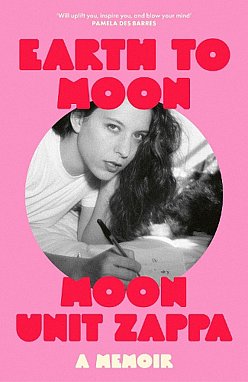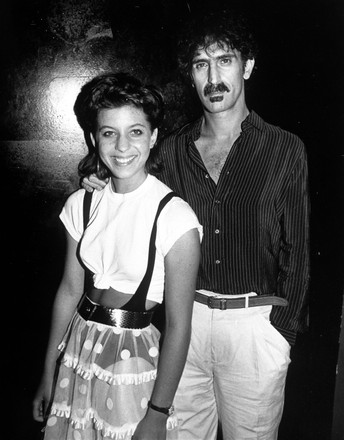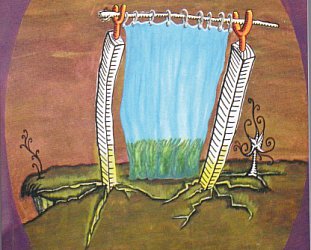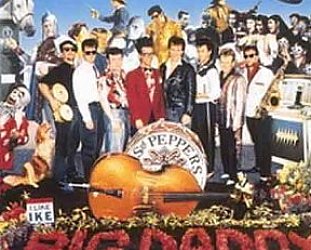Graham Reid | | 3 min read

When Moon Unit Zappa went to college she felt sorry for the kids because they had to share their name with other people, and she couldn't believe that some of the kids' parents had divorced because of infidelity.
Her dad Frank had serial relationships with women other than his wife Gail, sometimes these women staying in the family home.
“It's just fucking,” he says.
But Moon says she doesn't witness any warmth or affection other than on TV shows where adults kiss or hug one another. In place of affection she gets presents, Gail spending Frank's money by way of getting back at him for his “homewreckers”, among them a woman from New Zealand we are told.
And these are among the least surprising things revealed in Moon's remarkable memoir of living in a house where her father was mostly absent – down in the studio or on the road – and her permanently angry mother seemed to have to have learned all she knew about child rearing from Joan Crawford.
Gail would scream and shout abuse at Frank when he was around and ignore the kids' needs.
 Gail Zappa was notorious in the music industry as Frank's manager: she would be a tough if not impossible negotiator, prone to irrational behaviour and obsessed with money.
Gail Zappa was notorious in the music industry as Frank's manager: she would be a tough if not impossible negotiator, prone to irrational behaviour and obsessed with money.
Moon's book confirms all that, and more.
In many ways the four Zappa children – Moon, Dweezil, Ahmet and Diva – lived a strangely sheltered existence: Gail might have been unusual in her parenting (mostly indifferent, illnesses countered by what can only be called voodoo doctoring) but the kids ate junk food; they could read whatever they liked (Frank's girlie magazines and porn readily available) but rarely strayed far from the house.
Frank and Gail's families were severed off and unwelcome, Frank worked constantly in the studio and Moon – by her own detailed account – loved her father and craved his affection.
Or even just a modicum of attention.
It rarely came and when she was almost 20 she gets a phone call from her father – “the second time my father has ever called me in my life” – who tells her he has terminal cancer and been given a year to live.
The family rally around, the media isn't told, Frank keeps working, Gail investigates all kinds of potions and healers . . .
Moon writes in an interesting way: as a child she writes through a child's eyes, not able to judge or assess the behaviour around her so recording it as she experienced it.
By adolescence she sees more clearly how everyone in this seriously dysfunctional family has a position, her assigned role being loyal daughter and foil for Gail's rages (Dweezil too young).
As parents Frank and Gail are seen to be more than not merely wanting, but often derelict and disinterested. Frank finds any intrusion on his work an inconvenience to be ignored; Gail simply rages at Frank for his groupies and lovers, at the kids for . . . for being kids who need their mother.
 The world beyond their home was a mystery, as Moon discovered when going to high school.
The world beyond their home was a mystery, as Moon discovered when going to high school.
And when she and Frank make that Valley Girl song which becomes a hit, he is jealous and angry: critics had never given him the respect he felt he deserved (true actually) but now his daughter has had a hit while his sales languish.
But there is much worse when Moon wants to get married, when her daughter is born and is hospitalised with a life-threatening illness, when her marriage falls apart . . .
Gail is wilfully absent or obstructive at every turn.
Moon is broken and disappointed time and time again.
She is honest about her own shortcomings, perceived ugliness (dad's nose and hairiness) and failed careers as a singer, TV host, occasional actress and so on.
But if only a third of what she says about the Zappa madhouse is true it is still far too much.
Her love for her siblings are her source of strength, until they aren't.
Gail skews her will to marginalise Moon and Dweezil and so they have to engage lawyers. Gail is screwing them from beyond the grave.
This is a helluva strange but compelling story.
As she observes: "The saying goes that 'God only gives you what you can handle.' Well God didn't grow up in my atheist, Wiccan, fame-laden, oversexed, teetotalling, drug-free, cloistered, chaotic, non-communicative, workaholic, feral-feeling house."
Moon Unit Zappa's life was so strange -- and sad, although she frequently writes with humour -- that towards the end after going through the ashram/guru experience and plenty of therapy we find her in a nonprofit school of anatomy in Colorado Springs where she and others are watching and participating in an autopsy.
“In the same way that I needed to go to Burning Man to experience firsthand the amplification of the field of love and unconditional giving, I now find myself desperate to know the fullest extent of what it means to be and have been a person.
“I want to actually look inside and see who we all are underneath our personalities and stories, possessions and achievements, talents and preferences, shortcomings, failure, pain and genius.”
In a life story where so little makes sense, that -- ghoulish and strange as it may seem -- actually does.
.
EARTH TO MOON by MOON UNIT ZAPPA White Rabbit $40




post a comment